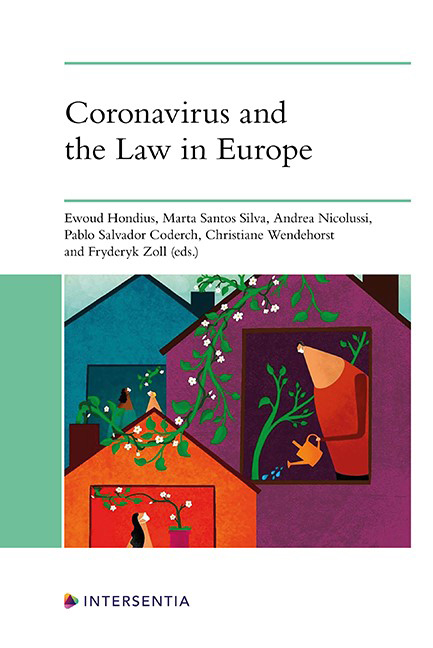Book contents
- Frontmatter
- Preface
- Contents
- List of Keywords
- List of Contributors
- PART I COVID-19 AND FUNDAMENTAL RIGHTS
- PART II STATES AGAINST THE PANDEMIC
- PART III COMPENSATION FOR COVID-19 RELATED DAMAGE
- PART IV CONTRACT LAW
- PART V CONSUMER LAW
- PART VI LABOUR AND SOCIAL LAW
- PART VII CORONAVIRUS CHANGING EUROPE
- Epilogue
- Annex: ELI Principles for the COVID-19 Crisis
- About the Editors
The Corona Crisis and Fundamental Rights from the Point of View of EU Law
Published online by Cambridge University Press: 10 December 2021
- Frontmatter
- Preface
- Contents
- List of Keywords
- List of Contributors
- PART I COVID-19 AND FUNDAMENTAL RIGHTS
- PART II STATES AGAINST THE PANDEMIC
- PART III COMPENSATION FOR COVID-19 RELATED DAMAGE
- PART IV CONTRACT LAW
- PART V CONSUMER LAW
- PART VI LABOUR AND SOCIAL LAW
- PART VII CORONAVIRUS CHANGING EUROPE
- Epilogue
- Annex: ELI Principles for the COVID-19 Crisis
- About the Editors
Summary
“Human rights are not a privilege conferred by the government, they are every human being’s entitlement by the virtue of his humanity.”
Mother TeresaIn 2020, the world was surprised by the so-called Corona crisis, which has had adverse effects in several areas. Although initially it appeared only as a major public health emergency, it turned into a crisis of solidarity, economics and also a legal crisis. The Corona crisis also highlighted some other problems in the EU, in particular the issue of solidarity and the effectiveness of adoption of legal acts and decision-making. The issue of fundamental rights violations was often raised. The Member States have adopted specific measures, which have also restricted fundamental rights in certain cases. In practice, the protection of public health has almost always been balanced against all fundamental rights, which were at least partially restricted. There were restrictions based on considerations for public health such as: restriction of free movement, infringements of data protection, and restriction of free economic activities and enterprise (e.g. compulsory closure of shops). Against this background, this contribution provides an overview of the protection of fundamental rights in the EU, their possible limitations and restrictions, and discusses key Charter’s fundamental rights during the Corona crisis.
INTRODUCTION
In 2020, the world was surprised by the so-called Corona crisis, which has had adverse effects in several areas. Although initially it appeared only as a major public health emergency, it turned into a crisis of solidarity, economics and also a legal crisis. When we talk about the latter, we are thinking mainly of the problems related to human rights at this time and their possible restrictions. The Corona crisis also highlighted some other problems in the EU, in particular the issue of solidarity and the effectiveness of adoption of legal acts and decision-making. The issue of fundamental rights violations was often raised. The Member States have adopted specific measures, which have also restricted fundamental rights in certain cases. Several essential legal issues appeared in this regard. Which rights are at stake and when do they apply in the Member States, when can they be restricted, and what are the solutions in the event of collision of several fundamental rights? In practice, the protection of public health has almost always been balanced against all fundamental rights, which were at least partially restricted.
- Type
- Chapter
- Information
- Coronavirus and the Law in Europe , pp. 3 - 24Publisher: IntersentiaPrint publication year: 2021
- 1
- Cited by



